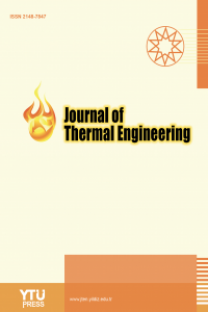Experimental investigation and validation of solar PV cooling for enhanced energy conversion efficiency for Indian climatic conditions
Experimental investigation and validation of solar PV cooling for enhanced energy conversion efficiency for Indian climatic conditions
Solar PV Cooling Performance Enhancement, PV Efficiency, Thermal Collector, Front Water Cooling,
___
- The article references can be accessed from the .pdf file.
- Yayın Aralığı: 6
- Başlangıç: 2015
- Yayıncı: YILDIZ TEKNİK ÜNİVERSİTESİ
R.praveen BHARATHWAJ, M. B. VARUN PRADEEP, P. PADMANATHAN, A. SATHEESH, N. R. DEVI
Amar BERKACHE, Abdellah BOUMEHANI, Belkhir NOURA, Rabah KERFAH
Experimental study of heat transfer in a helical coiled tube biomass fired rotary device
Prashant DESHMUKH, Satyajit KASAR, Niteen SAPKAL
Kafel AZEEZ, Abd Rahim ABU TALIB, Riyadh IBRAHEEM AHMED3
Modeling of parabolic collector (a new approach of concentration ratio calculation)
Tahseen Ali JABBAR, Raed S. BATBOOTI, Bassam A. MOHAMMED
Habeeb A. AJIMOTOKAN, Isiaka AYUBA, Hassan K. IBRAHIM
Pritam BHAT, Ananth S. IYENGAR, Abhilash N, Pavan KUMAR REDDY
